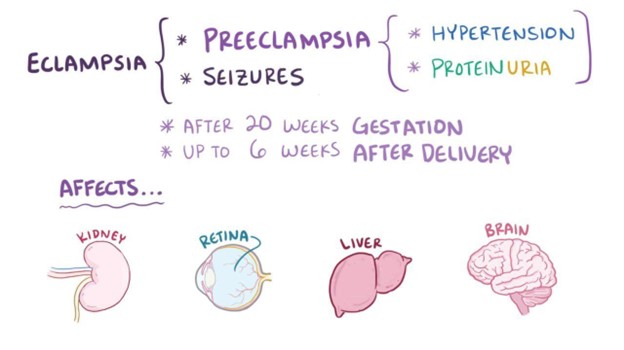A client is diagnosed with gestational hypertension and is receiving magnesium sulfate. Which finding would the nurse interpret as indicating a therapeutic level of medication?
Difficulty in arousing
Deep tendon reflexes 2+
Urinary output of 30 mL per hour
Respiratory rate of 10 breaths/minute
The Correct Answer is B
Choice A Reason: This is incorrect because difficulty in arousing is a sign of magnesium toxicity, which is a serious complication of magnesium sulfate therapy. Magnesium toxicity can cause central nervous system depression, muscle weakness, and cardiac arrest. The nurse should monitor the client's level of consciousness and stop the infusion if the client becomes lethargic or unresponsive.
Choice B Reason: This is correct because deep tendon reflexes 2+ indicate a normal and expected response to magnesium sulfate therapy. Magnesium sulfate is a muscle relaxant that can reduce the risk of seizures in gestational hypertension. The nurse should assess the client's deep tendon reflexes regularly and maintain them at 2+ or slightly diminished.
Choice C Reason: This is incorrect because urinary output of 30 mL per hour is below the normal range of 40 to 80 mL per hour and may indicate renal impairment or dehydration. Magnesium sulfate can cause renal toxicity or fluid retention, which can affect the urinary output. The nurse should monitor the client's urinary output and fluid balance and report any abnormalities to the doctor.
Choice D Reason: This is incorrect because respiratory rate of 10 breaths/minute is below the normal range of 12 to 20 breaths/minute and may indicate respiratory depression. Magnesium sulfate can cause respiratory depression or failure, which can be life-threatening. The nurse should monitor the client's respiratory rate and oxygen saturation and administer oxygen or antidote if needed.
Nursing Test Bank
Naxlex Comprehensive Predictor Exams
Related Questions
Correct Answer is C
Explanation
Choice A Reason: This is incorrect because sickle-cell anemia is a genetic disorder that affects the shape and function of the red blood cells. It is not related to the AFP level, which is a protein produced by the fetal liver and yolk sac.
Choice B Reason: This is incorrect because cardiac defects are abnormalities in the structure or function of the heart. They are not related to the AFP level, which is a marker of neural tube defects and abdominal wall defects.
Choice C Reason: This is correct because Down syndrome is a chromosomal disorder that results from an extra copy of chromosome 21. It is associated with a decreased AFP level, as well as increased levels of human chorionic gonadotropin (hCG) and unconjugated estriol (uE3).
Choice D Reason: This is incorrect because respiratory disorders are problems that affect the lungs and breathing. They are not related to the AFP level, which reflects the fetal development and integrity.
Correct Answer is D
Explanation
Choice A Reason: This is incorrect because ferrous sulfate is an iron supplement that is used to treat or prevent iron-deficiency anemia. It has no effect on magnesium sulfate, which is a medication that lowers blood pressure and prevents seizures in severe preeclampsia.
Choice B Reason: This is incorrect because potassium chloride is an electrolyte supplement that is used to treat or prevent low levels of potassium in the blood. It has no effect on magnesium sulfate, which can cause hypermagnesemia, or high levels of magnesium in the blood.
Choice C Reason: This is incorrect because calcium carbonate is an antacid that is used to treat or prevent heartburn, indigestion, or calcium deficiency. It has no effect on magnesium sulfate, which can cause hypocalcemia, or low levels of calcium in the blood.
Choice D Reason: This is correct because calcium gluconate is an antidote that is used to treat magnesium toxicity, which can occur when magnesium sulfate is given in high doses or for prolonged periods. Calcium gluconate reverses the effects of magnesium sulfate on the neuromuscular and cardiovascular systems, such as muscle weakness, respiratory depression, cardiac arrhythmias, or cardiac arrest.

Whether you are a student looking to ace your exams or a practicing nurse seeking to enhance your expertise , our nursing education contents will empower you with the confidence and competence to make a difference in the lives of patients and become a respected leader in the healthcare field.
Visit Naxlex, invest in your future and unlock endless possibilities with our unparalleled nursing education contents today
Report Wrong Answer on the Current Question
Do you disagree with the answer? If yes, what is your expected answer? Explain.
Kindly be descriptive with the issue you are facing.
